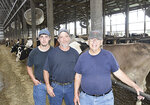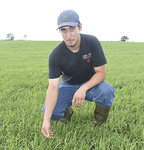NEW ULM, Minn. – As the Griebels gather around and discuss the current field conditions and anticipated first-cutting of ryegrass, there is excitement in their voices; gratitude for the decisions made prior for the farm and the promise that tomorrow holds.
“Working with my dad and grandpa is work I don’t take for granted,” Isaac said. “Many don’t have this option.”
Isaac is the sixth generation of Griebels to milk cows on the farm site in Brown County near New Ulm. He and his father, Mike, milk 180 cows and run 330 acres with the help of his grandfather, Julian.
The youngest Griebel returned to the farm following graduation from Ridgewater College in 2017. While he is insistent on making change for progress, Isaac also recognizes the legacy that remains on his family’s dairy farm.
His grandfather is appreciative of it too.
“The No. 1 thing is that it’s a good feeling to be able to come out here every day and there’s always something to do,” Julian said.
Julian began farming in 1961 after serving in the United States Airforce beginning in 1957.
“When I left the farm, I told my dad I was never coming back,” Julian said. “I was stationed in England when I realized that wasn’t the life I wanted. I called Dad and told him not to sell the cows. I was coming home.”
Julian and his wife, Janice, raised 10 children on the farm.
In Julian’s time as the farm owner, he experienced the devastation of the 1980s farm crisis. At one point, interest rates were 16% but the farm’s rate of return on assets was only 5%.
“Those interest rates killed me,” Julian said. “We received a production credit and had rules to live by. We did that and made it through. We were able to raise the kids here.”
One of Julian’s saving graces was the purchase of a round baler which allowed the family to harvest their forages more efficiently and also provide custom work for area farmers.
“That was my salvation,” Julian said.
Mike agreed.
“By the end of the season, I was so sick of that yellow baler,” he said, jokingly.
Mike took over the operation in 1993, following a similar path as his father in the forces. He left the United States Navy in 1988, went to college and then bought land to run near the home farm. Mike purchased the herd from Julian May 1, 1994.
“I wasn’t scared; maybe I was foolish,” Mike said. “We did it in stages. I rented the farm site for a while and rented some land.”
Nearly two decades later, Mike purchased the farm site. Then, shortly after, Julian sold the land to Mike and he retired from the daily operations of the dairy, only to continue doing some custom baling.
In the Griebels’ time farming together, they withstood the tornado of 1998, which changed the way the family decided to make improvements going forward.
After the storm went through southern Minnesota, the Griebels were left with a severely leaning barn and the need to rebuild. With the immense demand for contractors, the Griebels rebuilt the barn themselves and continued constructing their own facilities as needed.
“For the entire winter, we didn’t have a holding area, and I went three to four months milking without a roof on the parlor,” said Mike of the farm’s double-8 milking facility.
The Griebels rebuilt the main barn and parlor and added a new section on to the barn over the course of two years. Over the time, they have also put up a machine shed and shop.
“Once we started building, it took a long time,” Julian said.
Mike agreed.
“For the machine shed, we put up the main frame in one weekend,” he said. “It all happened really slowly, but we just kept moving forward.”
Now, with Isaac involved on a full-time basis, the Griebels continue to move forward.
“By the time Isaac was going to college, we had decided that either he comes back to the farm or the cows go,” Mike said. “Now, we’re in the very beginning stages of getting a partnership set up.”
Isaac agreed.
“I wasn’t making too many decisions until last year,” the 24-year-old said. “But, we need it to be more legally binding.”
Since Isaac’s return to the farm, he has taken over breeding and calf care. However, his passion lies in nutrition and forage management. The Griebels recently adapted their practices to incorporate more alternative forages like winter rye, triticale, ryegrass, sorghum-sudangrass and clover in a double-cropping system.
“We don’t have much acreage for the number of cows we have, so we really have to be as efficient as we can be,” Isaac said.
This year, the Griebels eliminated their corn-on-corn fields, which accounted for about half of their total land base.
“I’ve always liked the challenge of matching a forage with the needs of animals and encouraging that symbiotic relationship,” Isaac said. “I have ideas and so far, they’ve worked.”
Mike agreed.
“We really appreciate (Isaac’s) ambition,” he said. “Some days you want to throw your hands up in defeat, but he’s always asking questions and challenges us to do a good job.”
As the Griebels look to the future of their farm, they are humbled by the decisions of generations before them and the decisions that will come to keep the dairy a staple in Brown County.


Comments
No comments on this item Please log in to comment by clicking here